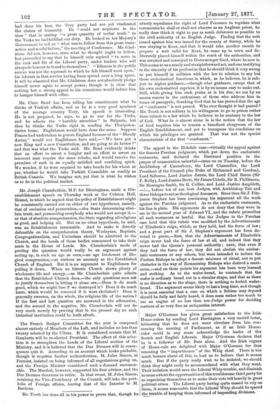Mr. Tooth has done all in his power to prove
that, though he
utterly repudiates the right of Lord Penzance to regulate what ceremonies he shall or shall not observe as an Anglican priest, he really does think it right to pay as much deference as possible to the civil authority of an English Judge. Finding that the writ issued against him was issued for the county of Surrey, while he was staying in Kent, and that it would take another month to prepare a writ valid for Kent, he came up to town and de- liberately placed himself within the reach of the authorities, and was arrested and conveyed to Elorsemonger Gaol, where he now is. This seems to us a manly and straightforward act, and one testifying to the sincerity of his profession that he should think it very wrong to put himself in collision with the law in relation to any but those ecclesiastical functions in which, as he believes, he is sub- ject to higher guidance,—though what guidance, except that of his own ecclesiastical caprices, it is by no means easy to make out. Still, while giving him such praise as is his due, we can by no means concur in the enthusiasm of those who address him in terms of panegyric, thanking God that he has proved that the age of " confessors " is not passed. Who ever thought it had passed ? Mr. Tooth is not solitary in his willingness to go to prison rather than submit to a law which he believes to be contrary to the law of God. What he is almost alone in is the notion that the law of God requires him to remain a beneficed clergyman of the English Establishment, and yet to transgress the conditions on which his privileges are granted. That was not the special characteristic of the first "confessors."


































 Previous page
Previous page